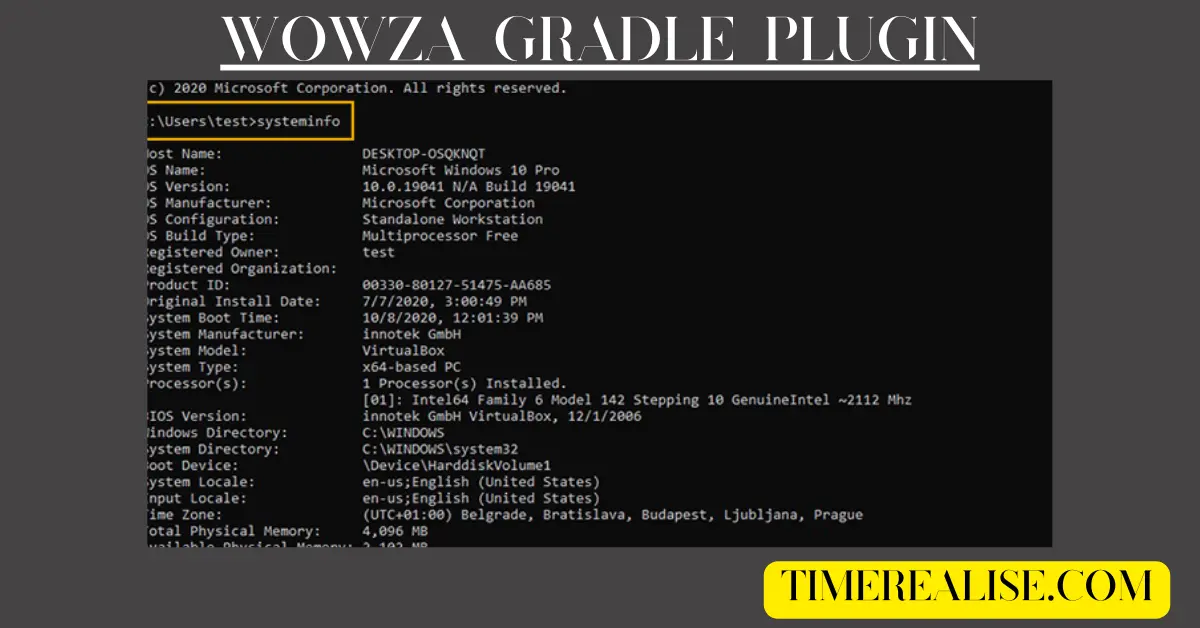Wowza Gradle Plugin: Automating Builds and Deployments for Success
In the fast-paced world of media streaming, developers require powerful tools to manage and automate tasks efficiently. One such tool that stands out is the Wowza Gradle Plugin. Designed to enhance workflows for developers working with the Wowza Streaming Engine, this plugin simplifies everything from building and testing to deploying custom modules, making the development process smoother and more reliable. If you’re looking to boost your productivity in streaming server development, this plugin is a game-changer. The Wowza Gradle Plugin is an automation tool designed for developers using the Wowza Streaming Engine. This plugin integrates with Gradle, a widely used build automation tool, to streamline custom modules’ development, testing, and deployment processes.
What is the Wowza Gradle Plugin?
The Wowza Gradle Plugin is a developer-friendly tool designed to streamline project builds, automate repetitive tasks, and simplify the management of dependencies within the Wowza Streaming Engine development environment. Built using Gradle, a popular build automation system, the plugin helps developers create, package, and deploy custom Wowza modules and applications efficiently. By integrating this plugin into their projects, developers can save significant time while ensuring consistency and accuracy throughout their workflows. From compiling Java code to packaging it for deployment, the Wowza Gradle Plugin handles it all seamlessly.
Why Use the Wowza Gradle Plugin?
The Wowza Gradle Plugin offers a wide range of benefits for developers working on live-streaming projects. Here are some key reasons why it is an essential tool:
- Automation of Builds: By automating the build process, developers can avoid manual errors and repetitive tasks.
- Dependency Management: The plugin ensures that all libraries and dependencies are handled efficiently.
- Streamlined Deployment: Simplifies the deployment of Wowza modules into the Wowza Streaming Engine.
- Consistency: Builds are reproducible and consistent across environments, ensuring stability.
- Time Efficiency: Reduces development time by managing tasks such as compilation, testing, and packaging.
For developers looking to improve their efficiency and focus on core functionality, the Wowza Gradle Plugin offers an indispensable toolkit.
Key Features of the Wowza Gradle Plugin
Automated Deployment
Automated deployment is one of the most significant benefits of using the Wowza Gradle Plugin. Once a build passes the testing stage, the plugin can automatically deploy the application to the Wowza Streaming Engine. This automation minimizes the possibility of human mistakes and ensures that updates are deployed consistently across different environments. Additionally, the plugin offers a rollback mechanism, allowing users to revert to a previous stable version in case of deployment failure.
Multi-Instance Management
Many organizations run multiple Wowza Streaming Engine instances across development, staging, and production environments. The Wowza Gradle Plugin uses a single build to manage multiple Wowza instances. Gradle file. This centralized configuration simplifies the deployment process by reducing the complexity of managing multiple servers. Developers can define tasks for specific environments and automate the deployment of new updates across all instances.
Integration with IDEs
The Wowza Gradle Plugin integrates smoothly with popular Integrated Development Environments (IDEs) like IntelliJ IDEA and Eclipse, enabling developers to work in their chosen environments. By integrating directly into the IDE, developers can streamline the build and deployment process, making testing new features easier, debugging issues, and iterating quickly.
Setting Up the Wowza Gradle Plugin
Prerequisites for Installation
Before installing the Wowza Gradle Plugin, ensure you have the required tools set up, including Gradle and the Wowza Streaming Engine. Once these tools are installed, you can easily integrate the plugin into your Gradle project by adding the necessary dependencies to the build.gradle file.
Configuring the build.gradle File
The build.gradle file is central to the setup of the Wowza Gradle Plugin. In this file, you can define the configuration properties for your project, such as the Wowza server directory, the deployment path, and environment-specific settings. By configuring these parameters, you ensure that your build process is automated and runs smoothly.
Integrating Wowza with Your Existing Gradle Project
Integrating the Wowza Gradle Plugin with an existing Gradle project is straightforward. Simply add the plugin’s dependencies to your project’s build file, and Gradle will take care of the rest. This seamless integration ensures that your Wowza modules are automatically built, tested, and deployed in a way that aligns with your current workflow.
Advantages of Using the Wowza Gradle Plugin in Live Streaming
The Wowza Gradle addresses the complexities of live-streaming development by automating critical processes. Here’s how it makes a significant difference:
- Faster Development Cycles: By automating builds and deployments, developers can iterate faster and focus on adding new features.
- Error Reduction: Automation minimizes manual errors during compilation, packaging, and deployment.
- Improved Code Quality: Integration with Gradle allows developers to run automated tests as part of the build pipeline.
- Seamless Integration: Compatible with Wowza Streaming Engine, making it easy to deploy custom modules.
For live streaming solutions, where stability and performance are critical, these advantages make the Wowza Gradle Plugin an invaluable tool.
Read More: fran candelera
Use Cases for the Wowza Gradle Plugin
Large-Scale Streaming Services
Organizations running large-scale streaming services with multiple Wowza instances can benefit from the plugin’s automation and multi-instance management capabilities. By centralizing deployment tasks, teams can roll out updates more efficiently across hundreds of servers.
Continuous Integration/Continuous Deployment (CI/CD) Pipelines
The Wowza Gradle Plugin integrates seamlessly with CI/CD tools like Jenkins, Travis CI, and GitLab CI, enabling fully automated build and deployment pipelines. This integration is crucial for organizations that follow DevOps practices and need to push frequent updates to their Wowza Streaming Engine environments.
Custom Streaming Solutions
For businesses with highly customized Wowza deployments, the Wowza Gradle Plugin offers the flexibility to create tailored deployment scripts that align with specific business requirements. Whether custom configurations, module integrations, or specialized deployment steps, the plugin provides the tools to build and maintain custom streaming solutions.
Best Practices for Using the Wowza Gradle Plugin
Organizing Project Structure for Efficient Workflow
A clean and organized project structure is essential for managing large streaming projects. When working with the Wowza Gradle Plugin, keep source code, and configurations, and build outputs in separate directories to maintain clarity and facilitate easy navigation.
Managing Dependencies and External Libraries
With Gradle, managing dependencies is straightforward. The plugin makes it easy to include libraries and dependencies that your Wowza modules require. Keeping your project’s dependencies up to date ensures that your modules are always built with the latest compatible versions of required libraries.
Leveraging Gradle’s Caching for Faster Builds
Gradle’s caching feature can significantly speed up your build process. By using incremental builds, Gradle caches previously compiled parts of your project, meaning only the changed components need to be rebuilt. This feature reduces the build time and ensures that the development cycle remains efficient.
Troubleshooting Common Issues
Gradle Version Issues
Make sure you’re running a suitable version of Gradle. Incompatible versions can lead to installation failures or unexpected behaviour during the build process.
Deployment Failures
Check your build’s Wowza server connectivity, credentials, and configuration settings—gradle file. Misconfigurations, authentication errors, or server accessibility issues are common causes of deployment failures.
Configuration Errors
Ensure that all properties in the wowza block (e.g., serverUrl, applicationName) are correctly defined and valid. Syntax errors or invalid values in your build. Gradle script can prevent the Wowza Gradle Plugin from functioning properly.
FAQs
What is the Wowza Gradle Plugin used for?
The Wowza Gradle Plugin automates building, testing, and deploying custom modules for the Wowza Streaming Engine, streamlining development workflows.
Is the Wowza Gradle Plugin compatible with all IDEs?
Yes, it integrates with popular IDEs like IntelliJ IDEA and Eclipse, enhancing the build and deployment processes directly within the development environment.
Can the plugin manage multiple Wowza instances?
Yes, it supports multi-instance management, allowing developers to deploy updates across various environments (development, staging, production) from a single configuration.
How does the plugin reduce build times?
It leverages Gradle’s caching and incremental build features, ensuring only modified components are rebuilt, significantly speeding up the process.
What are common troubleshooting tips for the plugin?
Ensure your Gradle version is compatible, check server connectivity and credentials, and verify the accuracy of your build.gradle configuration to avoid deployment issues.
In Short
The Wowza Gradle Plugin is a powerful tool for developers working with the Wowza Streaming Engine, offering automation, efficiency, and consistency in building, testing, and deploying custom modules. By simplifying complex tasks and integrating seamlessly with IDEs and CI/CD pipelines, it enhances productivity and ensures reliable streaming solutions.
Stay Connected: Timerealise.com






